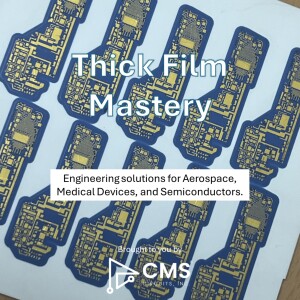Thick Film Mastery
Dive into the world of thick film technology with Thick Film Mastery, the essential podcast for electrical and application engineers shaping the future of aerospace, medical devices, industrial systems, and semiconductors. This 11-episode series unpacks the art and science of designing with thick film—from crafting conductor traces and integrated resistors to mastering multi-layer circuits, dielectrics, and substrates—tailored to the unique demands of your industry. Discover how thick film powers aerospace sensors soaring through extreme conditions, medical biosensors saving lives with precision, industrial heaters thriving in tough environments, and semiconductor hybrids pushing the boundaries of density and performance. Each episode offers in-depth technical insights, real-world case studies—like de-icing a jet wing or monitoring a patient’s vitals—and actionable design strategies. Learn to select materials, optimize for high power density, and overcome challenges like thermal management and biocompatibility, all informed by cutting-edge research from Google Scholar, Scientific Digest, and beyond. Whether you’re an aerospace engineer seeking lightweight reliability, a medical designer prioritizing safety, an industrial expert needing rugged solutions, or a semiconductor innovator chasing compactness, Thick Film Mastery delivers the tools to succeed. Hosted by microelectronics specialists, this series bridges theory and practice, empowering you to transform concepts into industry-leading products. This series is brought to you by CMS Circuits—Building the Future, Layer by Layer. https://www.cmscircuits.com
Episodes

Monday Apr 07, 2025
Monday Apr 07, 2025
Multi-layer thick film technology layers conductors, resistors, and dielectrics on ceramic substrates like alumina, creating compact, high-function circuits. Screen-printed and fired at 850°C, it uses vias for 3D connectivity, ideal for wearables and IoT. Precision is vital—misalignment causes shorts, and thermal stress can create cracks.

Monday Mar 31, 2025
Monday Mar 31, 2025
Conductor pastes are essential for thick film circuits, with silver, gold, and copper as key materials. Silver is cost-effective but migrates in humidity; gold resists corrosion and suits biosensors; copper offers high conductivity for heaters. Each has unique applications, challenges, and performance characteristics that guide selection in circuit design.

Tuesday Mar 25, 2025
Tuesday Mar 25, 2025
Integrated resistors embed resistance into substrates, enhancing reliability and saving space in circuits. Made from materials like ruthenium oxide or carbon, they’re screen-printed and laser-trimmed for precision. Ideal for biosensors, heaters, and wearables, they offer high power density but require careful material selection to manage thermal drift.

Saturday Mar 15, 2025
Saturday Mar 15, 2025
This series focuses on analyzes Trump’s 2025 tariffs—25% on Canada/Mexico, 10% extra on China—focusing on microelectronics. Highlights rising costs, supply chain risks, and reduced U.S. competitiveness due to disrupted trade with key partners. Short-term fixes are noted, but long-term stability requires strategic shifts. A balanced approach is urged to protect your industry. Visit https://www.cmscircuits.com/blog

Saturday Mar 15, 2025
Saturday Mar 15, 2025
Conductor traces are crucial, acting like arteries by efficiently delivering power and signals. Made from silver, gold, or copper pastes, they are screen-printed on substrates and fired at 850°C for durability. Silver is cost-effective for wearables; gold offers corrosion resistance for biosensors; copper provides high conductivity for heaters. Despite challenges like thermal expansion mismatches and silver migration, these traces support diverse applications from heaters to smartwatches.

Tuesday Mar 11, 2025
Tuesday Mar 11, 2025
Thick film technology revolutionizes microelectronics with affordability, durability, and compactness. It involves screen-printing pastes on substrates like alumina, then firing at 600-1000°C to create high power density circuits for heaters, biosensors, and wearables. Cost-effective and reliable in harsh conditions, it supports multi-layer designs. Used in automotive sensors, medical biosensors, and aerospace heaters, it offers an innovative toolkit for engineers.
